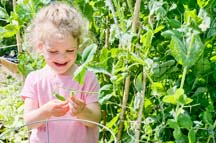Learning about local food
Becoming food literate
By Emma Levez Larocque
 How much do you know about the food you eat? Many people don't take the time to think about this question as they are rushing around living their lives. At one time food production, gathering, and preparation were crucial parts of most people's daily routine. By necessity we knew what we had to grow to get the nutrients we needed in our diet each year, and through tradition we knew how to grow it and gather it.
How much do you know about the food you eat? Many people don't take the time to think about this question as they are rushing around living their lives. At one time food production, gathering, and preparation were crucial parts of most people's daily routine. By necessity we knew what we had to grow to get the nutrients we needed in our diet each year, and through tradition we knew how to grow it and gather it.
But in today's fast-paced world it seems the larger population has lost that valuable knowledge somewhere between fast food restaurants and supermarkets. Some of us don't know much more about our food than that we can get it at the store. Still, food is so important to us that it's no wonder people are demanding to increase their food literacy. Food literacy?
"Literacy is not just about being able to read and write," says Literacy Outreach Coordinator Emma Larocque. "It's about being able to function well in every aspect of your daily life. So, literacy is about computers, it's about math, it's about health—and it's about food." Being 'food-literate' means knowing how to eat well for your health and your budget—and still enjoying the food you eat. Sounds simple, right?
Take a look at your dinner plate tonight and ask yourself how much you know about the food lying there. Where was it grown? Who grew it? If you had to grow it, could you? How nutritious is it? How much fat and sugar is in it? Are they "good" fats and sugars, or "bad" ones?
Learning about food is a life-long task. There is always more to learn—and doing so can enrich your life in many ways (not the least of which is improving your health). One of the best ways to increase your food literacy is to get involved with the local food movement—to learn about where your food is coming from and how it is grown.
The Powell River Food Security Project is a local initiative that strives to make it easier for people to access safe, healthy food. It creates opportunities for people to participate in activities to help them grow, preserve, and prepare food, explains coordinator David Parkinson. "Many of us no longer understand what it takes to grow even a part of the food we eat. [We] don't really understand the complexity of the globalized food production and distribution system where our food comes from. This system is a miracle when it works well, but there are reasons to think that it might not be around much longer in its present form. We all need to work together to create alternative and more local food systems. Luckily, the Powell River region is a hotbed of activity and projects to increase everyone's food literacy and create a robust regional food system."
There are plenty of ways to get involved in local food projects and increase your food literacy skills! Here are a few places that can help:
Powell River Food Security Project
fsp@prepsociety.org • 604 485-2004
Regular email updates with news of activities, events, workshops, etc.
Open Air Market
Sat, 10:30-12:30, Sun 12:30-2:30 PM at the Paradise Exhibition Park on McLeod Road. Good place to buy local produce and meet your farmers and food producers. For more information, contact Market Coordinator Jesse Black at jesseblack@gmail.com.
Good Food Box
Comes out on the second Wednesday of each month. A community bulk-buying program for fresh produce. Contact Annabelle at 604 485-8213.
Community Gardens
Seventh Day Adventist Church, Kelly Creek, Sliammon, demonstration garden at the Community Resource Centre.
Kale Force
Meets 2nd Wednesday of each month at 5 pm at the Community Resource Centre on Joyce Avenue. Potluck and conversation about food and gardening
Skookum Gleaners
(Was the Fruit Tree Project)
604 485-4366 • gleaners@skookumfood.ca
Helps homeowners pick and save fruit that might otherwise go to waste; helps reduce bear problems and feed people in need.
50-Mile Eat-Local Challenge & the Edible Garden Tour
The 2010 50-mile eat-local challenge celebrates its 5th anniversary. For 50 days, we will choose as much local food as we can get our hands on. The 50 days begin Sunday, Aug 8, also the day of the second annual Edible Garden Tour. Contact David Parkinson at fsp@prepsociety.org or 604 485-2004.